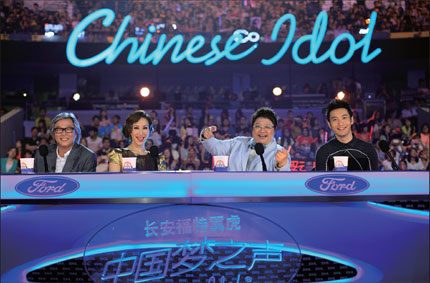
 |
| "Voice of the Chinese Dream" judges (from left) Wang Wei-chung, Coco Lee, Han Hong and Huang Xiaoming.(Photo/Shanghai Daily) |
The first edition of "Chinese Idol" - the Chinese version of "American Idol" - gets high ratings but is criticized for being too sentimental, tearful - and even dishonest. Xu Wei reports on the "localization."
Another reality TV show has fallen victim to the sins of many reality shows in China - sensationalism, sentimentality and tears.
This time it's the first edition of "Chinese Idol" - recently renamed "Voice of the Chinese Dream" - the Chinese version of "American Idol" that has been airing since April on Dragon TV.
The format has been so "localized" and tweaked to appeal to popular tastes that it has generated controversy for focusing too much on contestants' sob stories, hard-luck tales and inspirational struggles.
So important has the supposedly heartwarming "story" behind the contestant become that some biographies have been hyped and distorted. Internet users have been quick to point out inconsistencies and what they call lies.
Still, it's very popular. The show airing at 10pm on Sundays in Shanghai is the top-rated show in its time slot. Nationally it's second only to Jiangsu Satellite TV's controversial - and critics say tacky - dating show "If You Are the One."
Because China's new President Xi Jinqping has called for the nation to realize the "Chinese Dream," the show's producers changed the name to "Voice of the Chinese Dream" ("Zhongguo Meng Zhi Sheng" ?D1ú????éù)
The Chinese version retains the original format's four-member jury panel, audience voting and a tough test for vocals in the early elimination rounds - singing without instrumental accompaniment.
But there are quite a few changes, notably a lot more sensational parts of the show - narration of contestants' personal stories, tears when they are forced to leave the stage, and surprise guest performers with powerful stories that move the audience to tears.
Director Wang Leiqing says "the goal is to make a heartwarming and inspirational series about people's never-ending efforts to pursue their dreams - rather than a simple singing contest."
Shanghai college student Elena Zhang is a fan who says it's acceptable to inject some emotional personal stories but it shouldn't be overdone.
"The taste of Chinese audience differs from Western tastes," Zhang says. "Chinese are more likely to be concerned about a performer's story than their performance or stunt. But overuse of stories to catch public attention is a bad idea and can be a turn-off."
She cites the example of 16-year-old contestant Michelle Lu, who has been called a "liar" by some Internet users who researched her online.
Lu told the audience that she comes from a poor divorced family and that she bought all her clothes second-hand from street vendors, paying no more than 50 yuan (US$8.14) for the very outfit she was wearing on stage.
Some Internet users researched her background and said on their Sina weibo microblogs that the story can't be true, that the girl is too mature for her age and her singing is too sophisticated. They said her mother was spotted carrying an expensive Burberry handbag.
In the latest episode last Sunday, Lu burst into tears in the face of doubts and questioning from both the audience online and judges.
"The words of netizens do hurt," she said. "I promise I never lied."
Professor Wu Gang, a media expert from East China Normal University, says personal stories are hyped to get more attention for the show.
"American Idol" never delves into contestants' personal stories and tries to sensationalize them, he says, adding that the show is well-received and credible.
















 Teenage crash victims were talented students
Teenage crash victims were talented students


![]()
